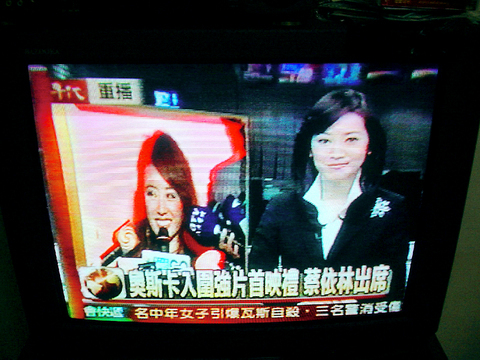The rumors of a romantic liaison between Jay Chou (
The pair provided scant details of their budding romance, but confirmed that they were closer than just friends and asked if the the media could please leave them alone. Fat chance. The story was front-page news in all the major papers and dominated the gossip rags until news emerged of Korean actress Lee Eun-joo's suicide Tuesday.

PHOTO: TAIPEI TIMES
Once the Jay-Hou story began to stale, Jay's erstwhile rumored paramour Jolin Tsai (蔡依林), who was said to be washing her face with tears over the affair, hosted a press conference Tuesday to let everyone know that she was, in fact, fine and that everyone should buy her new 224-page Jolin English Diary Book due out soon.

PHOTO: TAIPEI TIMES
Jolin's friends had been quoted in the Liberty Times (
Momoko Tao (
KMT Chairman Lien Chan's (
Also ducking media this week has been beauty queen Chiang Cheng-yun (
In another case of a Taiwanese pop act testing the waters in the US, Mayday (
This weekend all eyes will be on the Oscar celebration to see if Zhang Yimou's (張藝謀) Hero (英雄) can keep up the momentum for Chinese-language films gathered in Berlin last week, where Gu Changwei's (顧長衛) Peacock (孔雀) won the Jury Grand Prize and Tsai Ming-liang' (蔡明亮) walked away with the prize for artistic contribution to film for The Wayward Cloud (天邊一朵雲). The Oscar nominee's star, Zhang Ziyi (章子怡) was also the recipient Tuesday of the Hong Kong Critics Association award for best actress for her role in 2046. Tony Leung (梁朝偉) took the honors for the best male actor.

June 23 to June 29 After capturing the walled city of Hsinchu on June 22, 1895, the Japanese hoped to quickly push south and seize control of Taiwan’s entire west coast — but their advance was stalled for more than a month. Not only did local Hakka fighters continue to cause them headaches, resistance forces even attempted to retake the city three times. “We had planned to occupy Anping (Tainan) and Takao (Kaohsiung) as soon as possible, but ever since we took Hsinchu, nearby bandits proclaiming to be ‘righteous people’ (義民) have been destroying train tracks and electrical cables, and gathering in villages

Swooping low over the banks of a Nile River tributary, an aid flight run by retired American military officers released a stream of food-stuffed sacks over a town emptied by fighting in South Sudan, a country wracked by conflict. Last week’s air drop was the latest in a controversial development — private contracting firms led by former US intelligence officers and military veterans delivering aid to some of the world’s deadliest conflict zones, in operations organized with governments that are combatants in the conflicts. The moves are roiling the global aid community, which warns of a more militarized, politicized and profit-seeking trend

The wide-screen spectacle of Formula One gets a gleaming, rip-roaring workout in Joseph Kosinski’s F1, a fine-tuned machine of a movie that, in its most riveting racing scenes, approaches a kind of high-speed splendor. Kosinski, who last endeavored to put moviegoers in the seat of a fighter jet in Top Gun: Maverick, has moved to the open cockpits of Formula One with much the same affection, if not outright need, for speed. A lot of the same team is back. Jerry Bruckheimer produces. Ehren Kruger, a co-writer on Maverick, takes sole credit here. Hans Zimmer, a co-composer previously, supplies the thumping

Dr. Y. Tony Yang, Associate Dean of Health Policy and Population Science at George Washington University, argued last week in a piece for the Taipei Times about former president Ma Ying-jeou (馬英九) leading a student delegation to the People’s Republic of China (PRC) that, “The real question is not whether Ma’s visit helps or hurts Taiwan — it is why Taiwan lacks a sophisticated, multi-track approach to one of the most complex geopolitical relationships in the world” (“Ma’s Visit, DPP’s Blind Spot,” June 18, page 8). Yang contends that the Democratic Progressive Party (DPP) has a blind spot: “By treating any